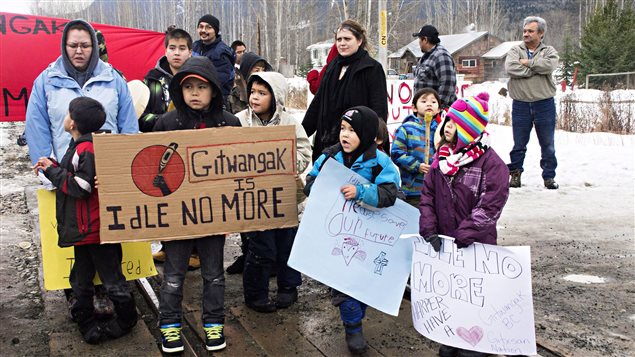First Nations are flexing more muscles in the wake of an historic decision last month by Canada’s Supreme Court.
In a case involving the Tsilhqot’in tribe that inhabits 1,700 kilometres in the British Columbia interior. the Court recognized aboriginal title for the first time ever in Canada
Observers said the ruling would have a profound effect on Canada’s economy, especially logging, pipelines and rail.
That is exactly what is starting to happen.
On Thursday, the hereditary chiefs of the Gitxsan First Nations in British Columbia served notice to CN Rail, logging companies and sport fishermen to leave their territory along the Skeena River in a dispute with the federal and provincial governments over treaty talks.
And the Gitxaala First Nation, with territory on islands off the North Coast, announced it would file a lawsuit in the Federal Court of Appeal on Friday challenging Ottawa’s recent approval of the Northern Gateway pipeline from Alberta.
Meanwhile, the Kwikwetlem First Nation claimed title to all lands associated with now-closed Riverview Hospital in Vancouver along with other areas of its traditional territory.
Also on Thursday, the right-leaning Vancouver-based Fraser Institute think tank issued a report on the Supreme Court ruling.
Short term, the Institute said the ruling will mainly impact treaty negotiations and development in B.C., where there are few historic or modern treaties.
Long term, the report said, the Supreme Court decision “will result in an environment of uncertainty for all current and future economic development projects that may end up being recognized as on aboriginal title lands.”
The Supreme Court decision gave First Nations across Canada exclusive control over decisions affecting land in which they have aboriginal title.
However, the ruling also made clear that economic development on title land can continue – either with consent, or–if there is no consent–when the Crown has proven that the project has a “compelling and substantial” public interest.
That last stipulation is where the battle in the courts will likely be joined.







For reasons beyond our control, and for an undetermined period of time, our comment section is now closed. However, our social networks remain open to your contributions.